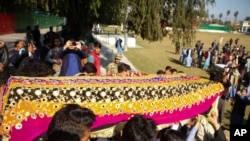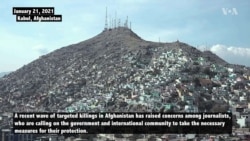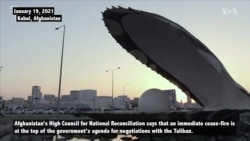A recent string of targeted killings in Afghanistan has created an atmosphere of fear among Afghan journalists who say they cannot carry out their duties under growing threats.
The Afghan Journalists Safety Committee, a local media advocacy group, has warned that the country might lose one of its main achievements in the past two decades, freedom of expression and press, if the attacks on journalists continue.
At least five journalists have been killed in Afghanistan in the past two months as part of a wave of targeted attacks against women working outside their homes, rights activists, tribal and community leaders, religious figures and journalists.
“If this trend continues, we will lose one of the most noteworthy achievements of this country, which is press freedom and freedom of expression,” Najib Sharifi, president of the Afghan Journalists Safety Committee, told VOA.
Journalists in many parts of Afghanistan say they no longer feel safe amid the increased killings of fellow journalists.
“We are in constant fear of being targeted,” said Sami Serat, a journalist working with a local radio station in Helmand province. “We do not feel safe in the city, in our offices or even at home.”
Serat added that the recent targeted killings of journalists in the country have “negatively affected” news coverage of his home province of Helmand, which has seen intensified clashes between government forces and Taliban militants in recent months.
“We rarely go to the scenes for news coverage. It has become nearly impossible for us to go there because of the fear of being targeted and the ongoing fighting in the city [Lashkargah] and provincial districts,” he told VOA.
Serat said that some of his fellow journalists have left Helmand for Kabul because “it has become difficult to work in the province, and some of our own journalists, fearing their lives, are now in Kabul.”
Walwala, 23, who worked as a journalist in the northern province of Baghlan, said that she left her job because of security concerns.
“I love my profession, but I had to stop all my social and journalistic activities,” she said.
Walwala said the killing of Malalai Maiwandi, a female journalist killed by unknown gunmen on December 10 in the eastern Nangarhar province, “has shocked all the female journalists across Afghanistan,” adding that many female journalists “are looking for jobs in other areas.”
She added that she would “only start working as a journalist again when the security situation gets better in the country.”
Nai, a local media organization in Afghanistan, reported that 11 Afghan journalists and media workers were killed in 2020.
Demand for investigation
The Afghan government says several suspected attackers in some targeted killings have been arrested, including those suspected of killing Mohammad Ilyas Dayee, a journalist with Radio Free Europe/Radio Liberty, who was killed December 12.
However, Mudasar Dawat, Dayee’s younger brother, told VOA that the security officials have not informed his family about the arrests.
“The government has not given us any information [about the progress made in the investigation],” he told VOA. “We have seen videos on Twitter and Facebook of someone confessing [to the killing], but that is not enough nor acceptable. We have the right to know about the investigation and who was behind the attack.”
Tariq Aryan, a spokesperson for the Afghan Interior Ministry, said the government is investigating into the targeted killings of journalists “in collaboration with media organizations.”
He blamed the Taliban for the attacks, claiming that the government has “arrested the killers of Dayee and Malalai Maiwand, and [those killers] were members of the Taliban.”
The Taliban have denied any involvement in the recent killings of human rights activists and journalists though they have targeted journalists and media workers in the past.
In 2016, the militant group claimed responsibility for an attack on a bus, killing seven Tolo TV staffers and injuring 25 others. The Taliban at the time described the journalists as “enemy personnel.”
Call for protection
In a letter released December 12, Reporters Without Borders (RSF) and a number of other media organizations called on the U.N. to take “concrete measures” for the protection of journalists in Afghanistan.
The letter urged the U.N. Security Council to “take serious actions to reduce violence and pressure the perpetrators to cease targeting journalists.”
Danish Karokhel, the head of Pajhwok Afghan News Agency, also believes the international community should pressure the Taliban to stop targeting journalists.
“It is not enough that they send press releases rejecting involvement in these killings. The Taliban should be accountable for the actions of their fighters in the provinces,” he told VOA.
The United States signed a peace agreement with the Taliban in February 2020, which paved the way for the start of intra-Afghan negotiations in September 2020.
However, violence in Afghanistan, particularly targeted killings, has surged in Afghanistan as negotiations continue in the Qatari capital, Doha.
Karokhel said that in some instances Taliban commanders and fighters have “created problems” for journalists, though the Taliban political leaders insist that they have changed and do not oppose free media anymore.
In a report released last year, Human Rights Watch (HRW) accused Taliban militants of imposing restrictions on media groups in the areas they control.
John Sifton, the Asia Advocacy director at HRW, told VOA in a recent interview that “what the Taliban say at the leadership level … does not mean that is what happens on the ground,” adding that the Taliban commanders in provinces “interpret things their own way.”
Afghanistan ranks 122nd out of 180 countries in RSF’s 2020 press freedom index.
The establishment of independent media has been considered as one of the main achievements of the post-Taliban Afghanistan, said RSF, adding that “given the country’s political and security challenges, this achievement is extremely vulnerable.”
VOA's Afghan Service contributed to this report.







